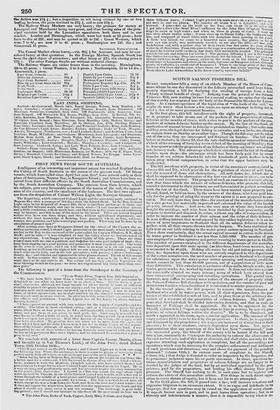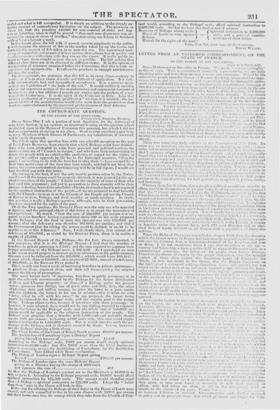SCOTCH SALMON FISHERIES BILL.
BURKE somewhere tells a story of an elderly Member of the Howie of Corn. mons whom he one day discovered in the Library intrenched amid huge folios,
gravely digesting a bill for declaring the stealing of turnips from a field " felony without benefit of clergy." Judging from the perusal of the Salmon Fielielies Bill, now waiting its turn for a second reading, we opine that the soul
of tide worthy has migrated into the body of the Honourable :Heather fur Lanca. shire. As a curione specimen of the legisl aim) of " the lords of the soil," we ought do worse than bestow a few sentet ces upon an attempt to bring out in relief a few of its more prominent beauties. In the first place, this bill interferes with the right of property, inasmuch as itproposes to take money out of the pickets of the proprietors of sahnon
fisheries at the mouths of rivere with a view to put it in the pockets of the pro- prietors of salmon fisheriee further up the streatn. By the law of Scotland, all application of manual lahour in fisheries is prohibited on Sunday ; hut stake-nets and bag-nets, the legal devices for fishing in estuaries and sea-lochs, ate allowed to remain down on Sundey as on other days. Though time fish may pot be taken out of the nets, they are intercepted and detained on Sunday. The bill now beffire us declares, in clause 2t1, that the nets shall be opened or removed from six o'clock of the evening of Saturday to six o'clock of the morning ofIlond ; that Is, it proposes to rob the proprietors of sea fisheries oftliirty. biz hours' use of their nets in every week. The advantage which their situation and the law of Scotlaud coolers upon them— the advantage which has been fairly paid for in every transfer of sea salmon fisheries by sale for bundle& of years back— is to be taken away without compensation, in order that the upper heritors may be made i it-her.
The bill interferes with propetty, in virtue of the enactment contemplaatreed or clauses fith and 7th, which provide for the regulation of eluices of mill leads, and the removal of dams and obstenctions. All mill.dams, fee. which
shall he supposed to be obstructive of the free run of salmon in tivtr., are to be altered and reconstructed. The proposal of such an enactment is a tacit minds-
sion that dams which the owners smilmon-tieheties. who promote this bill, considt r detrimental to their interests, are anti have existed in perfect accordance with the law of Sealant!. These dams have been erected upon property pur- chased, feued, or held on lease, by the owners of the dams, who have paid hea. vily for the privilege of using the water to the extent it is now proposed to cur- tail it. Not tally have they done this—the erection of the manufactories driven by water. powea has materially improved and enhanced the value of the landed property around them. And now, the very men of whom they have Ilcarly bought the privilege, and who have been enriched by their proxitnity, coolly propose to restrict and diminish its value, without any offer of compensation, in order to increase the number of their salmon cud the value of their fisheries! It is DO trifling interest that is endangered by this tubber legialation it is an in- terest of more itnportance to Scotland than all its salmon fisheries taken to. getlwr, with all their milers thrown into the bargain. We have statistical deo tails now on our table relating to the water.power cotton-spinning in Scotland. Tlie,e show conclusively, that the actual capital invested in cotton-mills driven by water power in Scotland is not less than 1,161,896/. The number of per- sons employed in cotton-spinning and power-weaving by water-power is 13,579. The number of persons employed in the different departments of the manufac- lure dependent upon this main• spring. (as bleachers, hand-loom weavers, &c.) is estimated to be 48,624. 'Halting allowance fur old and infirtu persons, chil- dren, Ike. dependent upon those who ate actively employed in this department of the cotton manufaertire, the total number of persons in Scotland who depentl fur subsistence upon the water. power cotton spinning and weaving establish- ments, cannot be less than 85 000 persons, out of a pupulation of little more than 2,005,000. This calculatiun is exclusive of flax-mills, bleach-works, dye- works, pi itit-wol Its, &c. wet lied by water-power. It does not take into account the corii-mills eituated on every bti emu ; many of which have existed from
time i atureumori 31. encouraging and extending agriculture. 'rids partial view, however, may suthee to convey some notion of the amount of property which the Salmon 1.4sheries Bill threatens with spoliation, and the number of pour and industrious families whuse livelihood it is calculated to render precarious.
In the secood place, the bill proposes to remove the manufacture's of Scotland who "yolk by water- power, with all their dependents, from the pro. tectien of the tatibliskivd courts of law, and to place them at the arbitrary dis- cretien of a creature of the proprietots of salmon-fisheries. The bill pro. 1)11505 that Scotland shall be divided into twelve districts, amid that in each an Inspeeter of Fishit.gs shall be appointed. He is to be appointed by the She' iti, (clause (RIO upon au application to him in writing, by any six proe- pi ietore of salumen tishings within the district." He is to be dismissed, and anoth. r appoitittd in his room, upon a similar application. The atnount of his salary (clause I2th ) is to be fixed by the proprietors. Its short, he is appointed rind diantiseed by the proprietore; his wages are increased or diminished at their pleasut e ; be is their creature, entirely dependent Nem them. Yet, upon a representation that any provision of this bill lute been " contravened," from this interested patty, the Shot iff of the county will be bound if the bill pass into a law, summarily to " interpose his authority to enforce time observance of the saitl recited acts, amid of this act as aforesaid, and shall claim not only for the expenses attending such application or complaint, but all the proceedings and operations which may be necessary for the complete enforcement and fulfilment of such provisions and directions, over and above the payment of the penalties aforesaid," (clause I 1th.) In certain cases of complaint to the Sheriff, (clause 5th, ) that Judge is directed to order an inspection by time Inspector, and to pronounce judgment upon his ex.parle statemeut. In short, questions be- tween manufactuters and pioprieturs of salmon-fishings are no longer to be decided by the judges of the laud, but by an individual appointed hy the pro- prietors, paid by the propsieturs, and holding his office during their good pleasure. The Shea has nothing to do in such cases but to register and enforce the edicts of tide anomalous arbiter. Few things in such direct oppo- sitiou to every dictate of equity, lias it been our lot to see attempted.
In the third place, the bill, if passed into a law, will increase vexatious and expensive litigation to an enormous extent. It is so vague anti indefinite in its language, that law questions may be raised on the application of every clause. It repeals former acts in part, and in part leaves them operative ; but in so slovenly and indeterminate a manner, that it is impossible to say what is fee pealed and what is left unrepealed. It is simpiy an addition to the already ex- cessive amount of contradictory legislation eet the subject. The provision in clause 211, thst the penalties exigible for non-removal of stake and bag-
on sawed:Iv, when it shall be prove4 " that such non-observnice was oc- ossm,s1 by -stm to or stress of weather," threatens -eve' y sea-fishery in Scotland with at Isost a lawsuit a week. In the fourth place. the bill will. if passed, operate injuriously to the public. It will increase the amount of ffsb in the market taken far up the rivers, and Slissiuisli the amount of fish taken in or near the sea. The concurrent testi- tosey se naturalists nod practical fishers proves. that salmon lose in qtudity and Sa eelittlesemeness with every mile they run up the rivers. It is the public in- terest to have them caught as near the sea as possible. The bill ordains that different close titres are to be observed in different livers. It is the opinion of the niaori,y of witnesses examined before the Committee, that this is both in • medico Anti impracticable. It will enable poachers to smuggle unwholes.orne fish into the market. On these ground., we maintain that this lull is in every clause contrary to justice, as it is in met y clause slovenly and dilficult of application. It is ravli- eslly and essentially bail. and incapable of antendlnimt. It is a geniilne speci- men ot the legisle.tion of " the lords of the soil." It would recklessly sacrifire a tarse and important section of time manufacturing and commercial interests of Scotism!. to put a few additional pounds per annum into the pockets of a sec- tion cf the istolowners. It is the spitit of the Corn- law in little. Like tlimit erninest production of " property. qoaliStettion " wistlotn, it is suicidal—the im- post rilstrent of the manufacturers would take more from the proprietors than cold he counterbalanced by the increased productiveness of their fisheries.



























 Previous page
Previous page